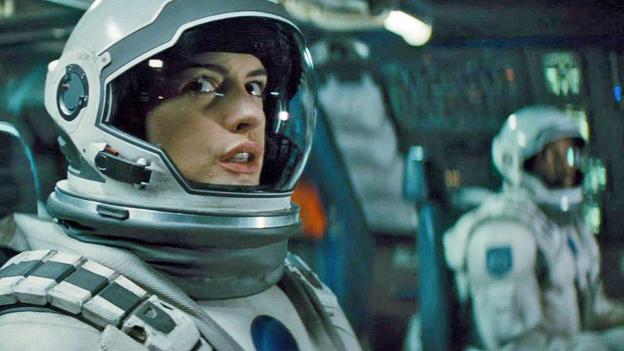Christopher Nolan follows up his Batman trilogy with a space epic. But has he really gone where no director has gone before? Nicholas Barber gives his verdict.
The end of the world is nigh. That’s the gloomy message that has been offered by Hollywood’s science-fiction blockbusters recently – and it’s getting gloomier all the time. For years, we had films depicting the ragged remnants of the human race traipsing around a post-apocalyptic desert: The Road, I Am Legend, The Book Of Eli and many more. And then, last year, we had Elysium, Oblivion and After Earth, three separate films that suggested we’d have to abandon the ruined earth altogether and set up camp on a space station or distant planet. Now we have Interstellar, a spectacular and cerebral take on the same scenario, co-written and directed by Christopher Nolan, the filmmaker behind The Dark Knight and Inception.
It stars Matthew McConaughey as Coop, a widowed farmer and father of two. He lives in a near-future where regular dust storms leave every surface coated in sand and where a mystery ‘blight’ is wiping out the world’s crops one by one. It’s a future which is much more chilling than the standard sci-fi wasteland, simply because it is much more recognisable: society is still functioning, most of the technology is familiar, but humanity doesn’t have many years left.
Coop is no ordinary farmer, however. He used to be a NASA test pilot, but now that governments have to commit all their resources to feeding the populace, none of them can afford to fund a space programme. That’s what Coop thinks, anyway. In fact, after a fair amount of front-porch brooding and arguing with his father-in-law (John Lithgow), he discovers that NASA has been continuing its research in secret. What’s more, it has spotted a wormhole near Saturn which may serve as a gateway to another galaxy. NASA’s top boffin (Michael Caine) believes that a habitable planet can be located there, and he wants Coop to pilot the next wormhole-bound probe. The mission would force him to leave behind his beloved son and daughter – perhaps forever, and definitely for several years. But Coop is driven both by his wish to save humanity, and by his urge to climb off a tractor seat and back into a cockpit, so he agrees to blast off into space with the boffin’s testy daughter (Anne Hathaway), two other human co-pilots and two slab-shaped, sardonic robots.
It wouldn’t be right to reveal where these intergalactic explorers go or what they find, but it is fair to say that, once again, Nolan has taken a pulp genre film and given it a scope and seriousness that sets it apart from the competition. Just as his Batman trilogy was far more philosophical and knottily plotted than the average superhero movie, Interstellar is sufficiently grand and challenging to bear comparison with those two touchstones of mind-bending epic sci-fi: Kubrick’s 2001: A Space Odyssey and Tarkovsky’s Solaris.
The life galactic
What’s even more impressive is that Nolan doesn’t employ many more digital effects than those films did. There are certainly a few dizzying computer-generated visuals, but for the most part he relies on physical props and sets, and judicious location shooting (Iceland doubles for two alien planets). This choice lends Interstellar a sense of reality and bone-jarring danger that you don’t get from the shiny, video-game CGI in the most recent Star Trek movies. Just as important, Hans Zimmer’s music makes the film seem even more colossal than it would otherwise: Zimmer invokes the original meaning of ‘pulls out all the stops’, rattling our teeth with reverberating pipe-organ chords. And the acting is as full-blooded as anything you’d find in an earthbound drama. McConaughey, fresh from his Oscar win for Dallas Buyers Club, is particularly affecting. In one scene, his face is flayed by shock, grief and joy, and I found myself wondering which of his peers would have been capable of such raw intensity. Tom Cruise? Leonardo DiCaprio? Brad Pitt? None of the above.
Magnificent as Interstellar is for much of its running time, though, some viewers will leave the cinema feeling that it might just have been a daft sci-fi yarn, after all. Much of that feeling will stem from the dramatic climax, which is swamped by a mushiness that was kept in check in Inception, let alone the Batman films. McConaughey is shatteringly good during this key sequence, but it’s so contrived and sentimental that it wouldn’t get past the script editors on Doctor Who.
And there are other, earlier signs that Interstellar isn’t quite as boldly intellectual as 2001 or Solaris. There’s the clichéd moment at NASA when someone comments that Coop was “the best pilot we ever had” – so why didn’t they contact him sooner? There are the scenes, halfway through the mission, when the spacecraft’s crew members sit around explaining to each other what a wormhole looks like and arguing about which planet to visit next – shouldn’t they have sorted that out before they left earth? And, most jarring of all, there’s Hathaway’s hippy speech about how love transcends all physical boundaries. None of these moments is terrible (well, maybe Hathaway’s speech is), but they don’t belong in a film that ponders quantum mechanics as brainily as Interstellar does.
Essentially, Nolan ignores the ‘show don’t tell’ rule of fiction: he doesn’t let a theme or a concept go by without spelling it out to the audience. It’s possible that he felt he had to dumb down some of the dialogue (which he co-wrote with his brother Jonathan) to compensate for the complicated stuff about the space-time continuum. It’s possible, too, that at heart he just wanted to make a sweet, old-fashioned fable about a father’s love for his children. It seems as if was aiming to travel somewhere far more ambitious than mainstream Hollywood filmmaking – but, unlike Coop and co, he couldn’t quite get through the wormhole.

